A Tough Job for Jay Powell at the Fed Gets Tougher

© Caroline Gutman for The New York Times

© Caroline Gutman for The New York Times
香港引进了包括中国大陆社交媒体巨头小红书在内的新一批企业。香港财政司司长陈茂波说,这是一个重要的里程碑,预计将为香港快速发展的创科生态注入更多活力。
综合香港01和《星岛日报》报道,引进重点企业办公室星期四(10月9日)举行重点企业伙伴签约仪式,公布第五批重点企业名单,涵盖18家海内外公司,其中包括小红书,以及三家全球十大医药企业——英国的葛兰素史克(GSK)、瑞士的罗氏(Roche)和德国的默克(Merck)等。
陈茂波指出,新一批企业来自不同领域尖端产业,包括全球领先的药企、人工智能(AI)和新媒体等范畴,是重要的里程碑。
他提到,落户香港的企业总数增至100家,预计将为香港带来超过600亿港元(99.9亿新元)的投资、创造约2万2000个优质职位,预计将为香港快速发展的创新及科技生态系统注入更多活力。
陈茂波说,香港正积极加强与大湾区城市的合作,推动AI、生物科技及新能源等产业抓住巨大发展机遇。其中,位于深圳河沿岸的河套区是重要的合作据点,可率先试行创新政策,促进人才、资本、商品、数据甚至生物样本等生产要素的自由流通。
他指出,港深两地已在河套区建立跨境临床试验机构,加上人才共享、先进实验室及超级计算能力等有利政策,香港正逐步发展成为区域药物研发中心。
陈茂波强调,香港的目标十分明确,即吸引更多战略性企业赴港,构建更蓬勃的创科生态和可持续增长的产业基础,带动企业共同发展,并创造更多优质就业机会。

中国商务部、海关总署周四(9日)连发4则公告,对部分稀土设备和原辅料相关物项实施出口管制,对超硬材料相关物项实施出口管制;对锂电池和人造石墨负极材料相关物项实施出口管制;对部分中重稀土相关物项实施出口管制。
当被记者问及,中国商务部、海关总署联合发布公告,对超硬材料、稀土设备和原辅料、钬等5种中重稀土、锂电池和人造石墨负极材料相关物项实施出口管制。“请问中方此次出台出口管制政策,有什么考虑?”
中国商务部新闻发言人以答记者问方式回答称,“根据《中华人民共和国出口管制法》等有关法律法规,10月9日,商务部会同海关总署发布关于对超硬材料、稀土设备和原辅料、钬等5种中重稀土、锂电池和人造石墨负极材料相关物项实施出口管制措施的公告,将于11月8日正式实施。此前,我们已经向有关国家和地区作了通报”。
该发言人续称,“此次列管的相关物项具有明显的军民两用属性,中国依法依规实施出口管制措施,符合国际通行做法,更好地维护了国家安全和利益,更好地履行了防扩散等国际义务。中国政府愿与各国一道维护全球产供链稳定畅通,相关措施不针对任何国家和地区,对于合法合规的出口申请,中方将在审查后予以许可。同时,中方愿通过双边出口管制对话交流机制,与相关方就出口管制政策和实践开展沟通对话,共同促进、便利合规贸易”。
中国商务部、海关总署周四接连发布了:公告2025年第55号 公布对超硬材料相关物项实施出口管制的决定;公告2025年第56号 公布对部分稀土设备和原辅料相关物项实施出口管制的决定;公告2025年第57号 公布对部分中重稀土相关物项实施出口管制的决定;公告2025年第58号 公布对锂电池和人造石墨负极材料相关物项实施出口管制的决定。
当天稍早时,中国商务部还发布了两项关于加强稀土相关物项出口管制的公告,对含有中国成分的部分境外稀土相关物项以及稀土相关技术实施出口管制。
布鲁塞尔方面,欧盟委员会的一位发言人回应称,欧方对中国加强稀土出口管制的决定感到关切。该发言人补充道:“我们对这一声明感到关切。我们正在研究具体细节”。
中方此次对多个相关物项出口管制的收紧正值特朗普总统与习近平主席在韩国举行会晤的几周前。新加坡市场调研机构Edge Research的创始人蒂姆·张(Tim Zhang)向路透社表示,“从地缘战略角度来看,这有助于北京在本月晚些时候举行的特习韩国峰会之前提升影响力”。

© Ronen Zvulun/Reuters

法国著名律师与思想家罗伯特·巴丹戴尔(Robert Badinter)于2024年去世,以其象征性反对死刑的斗争闻名,将于周四被安葬于巴黎先贤祠。
著名律师与思想家罗伯特·巴丹戴尔(Robert Badinter)于2024年去世,以其象征性反对死刑的斗争闻名,将于周四被安葬于先贤祠(Pantheon)。
巴丹戴尔最为人所知的是他持续推动废除死刑的努力。
他曾亲眼目睹自己的一名客户被断头台处决的情景 – 这一执行死刑的方式在法国一直使用到20世纪70年代。
作为时任法国司法部长(在弗朗索瓦·密特朗总统任内),巴丹戴尔克服了公众的反对,赢得了议会支持,于1981年成功废除了死刑。
巴丹戴尔1928年出生于巴黎的一个犹太家庭,父亲二战期间死于索比堡(Sobibor)集中营。
作为一名律师,他曾起诉过一名臭名昭著的否认大屠杀的分子。
巴丹戴尔随后担任法国宪法法院院长,担任参议员长达16年,被视为法国许多人心中的道德指针,捍卫人权。
1991年,巴丹戴尔领导了由欧洲经济共同体(EEC)设立的仲裁机构,为南斯拉夫和平会议提供法律咨询,此前该国六个共和国中的两个——斯洛文尼亚和克罗地亚宣布独立。
这一机构后来被称为“巴丹戴尔委员会”,由成员国宪法法院院长组成,欧洲经济共同体是欧盟的前身。
巴丹戴尔委员会在1991年至1993年间发布了15份法律意见书,其中一份声明社会主义联邦共和国南斯拉夫已解体。
这为国际社会在1992年承认斯洛文尼亚和克罗地亚作为主权国家铺平了道路。

综合美联社、法新社消息,美国国务院10月9日星期三表示,已解雇一名美国外交官,解雇的原因是他隐瞒自己与一名据称与中国共产党有关联的中国女性存在的关系。
这名未被公开身份的员工曾在镜头前表示,这名中国公民“可能是间谍”。美国国务院补充说,尚未说明是否有针对该员工的间谍证据。被解雇的员工还表示,他伴侣的父亲是“一名坚定的共产党人”。
这被认为是美国自去年年底实施此类禁令以来,首起因违反规定而被解雇的案例。
美联社今年早些时候报道称,在拜登总统任期的最后阶段,国务院对所有在华美国政府人员、其家属以及持有安全许可的承包商实施了一项禁令,禁止他们与中国公民发生任何恋爱关系或性关系。
美国国务院发言人汤米·皮戈特在一份声明中表示,总统特朗普和国务卿鲁比奥已经审查了本次的案件,认定该外交官“承认隐瞒了一段与一名与中国共产党有明确联系的中国公民的恋爱关系”。审查得到该定论后,该外交官被开除出外交部门。
皮戈特说:“在鲁比奥国务卿的领导下,我们将对任何被发现破坏国家安全的员工保持零容忍”。
声明未透露该外交官姓名,但他与相关女性曾出现在一段由保守派活动人士詹姆斯·奥基夫秘密拍摄并发布在网上的视频中。
中国政府发言人拒绝就此事发表评论,称这是美国的内部事务。中国外交部发言人郭嘉坤在例行记者会上表示,反对以意识形态差异划线,反对恶意抹黑中国。
由跨党派国会议员组成的日本访问团和拉丁美洲及加勒比海邦交国赴台,出席双十节庆典。
据台湾外交部官网消息,日本国会跨党派友台团体“日华议员恳谈会”(简称日华恳)会长古屋圭司于星期四至五(10月9日至10日)筹组日本国会议员团访台参加双十节庆祝活动,总计有28名参众议员参加。
访问团在台期间,除向总统赖清德觐贺、参加双十节大会外,还将与立法院长韩国瑜、台湾日本关系协会会长苏嘉全晤叙、拜会台湾事实查核中心等,就台日议会外交及双方共同关切的议题交换意见。
另据台湾《自由时报》报道,古屋圭司星期三(8日)出席在东京举行的台湾双十节庆祝酒会时说,台日是具有深厚情谊与信任的伙伴,彼此在困难时都能互相帮助,并强调“台湾有事就是日本有事”,绝对不能让台海发生冲突。
台湾外交部官网消息称,拉丁美洲及加勒比海地区邦交国巴拉圭众议长拉多雷(Raúl Luis Latorre Martínez)、圣卢西亚总督查尔斯(H.E. Sir Cyril Errol Melchiades Charles GCSL, GCMG)伉俪,以及伯利兹总督察芙拉(H.E. Dame Froyla Tzalam)暨夫婿应台湾政府邀请,先后于10月7日至13日率团访台参加双十节庆祝活动。
上述邦交国在台期间,将分别与总统赖清德会面、接受外交部长林佳龙款宴,以及以主宾身份出席双十节等相关庆祝活动。外交部也将安排各项参访节目,有助访宾实地了解台湾政经发展现况,持续深化双方多元交流合作。

(德国之声中文网)台湾“上报”发表文章《中国如何走到“于朦胧之死被禁止追查”》,作者洪浦钊说,从中共中央最近颁布《中国共产党思想政治工作条例》、中国酒店电视强制看央视,到演员于朦胧坠楼事件中的过度审查,证实中国正在推进“思想控制—舆论控制—空间控制”的全面闭合系统。
文章说,这套系统的终极目标不是单纯维稳,而是建构一种数位极权模式,并且逐步向外输出。TikTok就是最直接的例子。当中国在内部全面收紧时,它同时透过算法与内容推送,把对外的叙事渗透到各国的公共空间。
作者认为,台湾在这一波趋势下尤其脆弱。一方面,台湾社会多元开放、资讯自由流动,这正是民主的强项;另一方面,当中国把审查、操控、宣传的模式向外复制,台湾往往成为第一波冲击的实验场。
作者表示,我们不能仅仅把中国的这些管制视为“内部控制”,因为它们已经跨越国界,成为新型态的战争样态。对台湾而言,真正的挑战不是如何评论中国“多严厉”,而是如何自我防卫。

整体经济疲软是否会拖累中国科技进步?
《华尔街日报》首席中国记者魏玲灵在她主笔的中国洞察专栏中,谈到“中国悖论”时指出,关于中国的两种说法——经济困境和科技进步——它们都是事实。中国长达40年由投资驱动的繁荣期已经结束。如今,中国正艰难应对房地产市场崩盘、青年失业率飙升和通缩加剧等问题。与此同时,中国的科技进步也是实实在在的。在AI、量子计算、电信和清洁能源等领域,中国不仅有竞争能力,在某些行业,中国甚至有引领之势。
魏玲灵认为,如果将中国的科技行业看作一个“国中国”,这两种景象就不矛盾了。该行业由巨额政府资金和庞大的理工科人才库推动,一切都服务于实现技术自主可控的国家使命。这种自上而下的模式可以在整体经济增长乏力之际,创造出若干世界级的创新高地。然而,科技行业的体量尚不足以驱动整个国家的发展。真正的问题是,整体经济增长乏力的局面最终是否会拖累这个非凡的创新机器。

亚洲Z世代正在觉醒
《纽约时报》发表文章《青年的呐喊:抗议之声点燃“亚洲之春” 》,作者Meena Kandasamy指出,一种新的反抗视觉语法正在南亚和东南亚的广阔地域上书写,实时直播给全球观众。这些难以忘怀的画面呈现的不是职业革命者,而是被逼入绝境的普通年轻人。不满的年轻亚洲人推翻或动摇了当权者,这已在去年的孟加拉国、2022年的斯里兰卡,以及几周前的印度尼西亚和尼泊尔发生。
作者说,阿拉伯之春从希望走向崩溃的最终轨迹是对未来可能走向的一个深刻警示,但这一次似乎有所不同。亚洲的Z世代并不把数字动员当作政治的附属品,而是政治本身。他们目睹了早前运动的失败,如今正从零开始构建属于自己的体系——去中心化、灵活、极具冲击力。他们正在找到自己的声音。掌权者若视而不见,将为此付出代价。
摘编自其他媒体的内容,不代表德国之声的立场或观点。
DW中文有Instagram!欢迎搜寻dw.chinese,看更多深入浅出的图文与影音报道。
©2025年德国之声版权声明:本文所有内容受到着作权法保护,如无德国之声特别授权,不得擅自使用。任何不当行为都将导致追偿,并受到刑事追究。

(德国之声中文网)美国国务院发言人皮戈特(Tommy Pigott)表示:“美国国务院已正式解雇一名外交官,该官员承认隐瞒了与一名同中共有关联的中国公民的恋爱关系。”
美国国务院表示,这名未透露其身份的官员在镜头前表示,这名中国女子“可能是间谍”,但未透露任何间谍活动的证据。
据美国国务院称,这名被解职员工称,其伴侣的父亲是“地地道道的共产党员”。
美国国务院表示,这是特朗普上任后不久签署行政命令后首次已知的解雇事件,特朗普在行政命令中要求所有员工“忠实执行总统的政策”。
美国国务院发言人皮戈特还表示,“我们将对任何破坏我国国家安全的员工采取零容忍政策。”
法新社报道称,这个十多亿人口国家的各个领域里,中国共产党无处不在,它的渗透涵盖从商业到教育的各个领域,许多普通中国人出于实际需要、或者意识形态的原因,与中共保持联系。
美国今年早些时候表示,将限制美国政府驻华工作人员与当地人建立恋爱关系。这一罕见举措令人想起冷战时期。
(法新社)
DW中文有Instagram!欢迎搜寻dw.chinese,看更多深入浅出的图文与影音报道。
© 2025年德国之声版权声明:本文所有内容受到著作权法保护,如无德国之声特别授权,不得擅自使用。任何不当行为都将导致追偿,并受到刑事追究。
US President Donald Trump says Israel and Hamas have agreed to the first phase of a Gaza peace deal.
It comes two years and two days after Israel launched a military campaign in Gaza in response to the 7 October 2023 attack, in which Hamas-led gunmen killed about 1,200 people and took 251 others hostage.
At least 67,183 have been killed by Israeli military operations in Gaza since then, including 20,179 children, the Hamas-run health ministry says.
Here is what we know about the agreement, and what remains unclear:
After intense negotiations in Egypt, Israel and Hamas have agreed to a first phase of a US peace plan, the US president said.
Announcing the deal on social media, Trump said: "This means that ALL of the Hostages will be released very soon, and Israel will withdraw their Troops to an agreed upon line."
"All parties" would be treated fairly, said Trump, who called these the "first steps toward... everlasting peace".
Israeli Prime Minister Benjamin Netanyahu called it "a great day for Israel" and said his government would meet on Thursday to approve the agreement and "bring all our dear hostages home".
In confirming the announcement, Hamas said it would "end the war in Gaza, ensure the complete withdrawal of the occupation forces, allow the entry of humanitarian aid, and implement a prisoner exchange".
Israel and Hamas do not speak directly to each other - the negotiations were brokered by Trump's Middle East envoy Steve Witkoff, Trump's son-in-law Jared Kushner, and mediators from Egypt, Qatar, and Turkey.
Israel's government is due to vote on the deal on Thursday.
If they formally approve it, Israel must withdraw its troops from Gaza to the agreed line, a senior White House official told BBC's US partner, CBS News. The withdrawal would likely happen within 24 hours, the official said.
After this happens, a 72-hour clock will begin where Hamas must release the living hostages.
The release of the hostages would likely begin on Monday, the senior White House official said.
What's been announced so far is just the initial phase of Trump's 20-point peace plan, which Israel has accepted and Hamas has partly agreed to.
However the announcements did not cover some thorny issues both sides have not reached a resolution on.
Notably, no details surround the disarmament of Hamas - a key point in Trump's plan. Hamas has previously refused to lay down its weapons, saying it would only do so when a Palestinian state had been established.
The future governance of Gaza is also a sticking point. Trump's 20-point plan states Hamas will have no future role in the Strip and proposes it be temporarily governed by a "technocratic, apolitical Palestinian committee", before being handed over to the Palestinian Authority.
Netanyahu appeared to push back on the Palestinian Authority's involvement last week, even as he accepted Trump's plan.
Ultranationalist hardliners within Netanyahu's ruling coalition, many of whom want to reconstruct Jewish settlements in Gaza, are also likely to object to this point.
Hamas, in response, said it still expected to have some role in governing Gaza.
In addition, as of Wednesday night, Hamas had not yet received the final list of Palestinian prisoners that Israel plans to release in exchange for the hostages in Gaza, a Palestinian source told the BBC.
The 20-point plan states that 250 life sentence prisoners plus 1,700 Gazans who were detained after 7 October 2023 will be released.

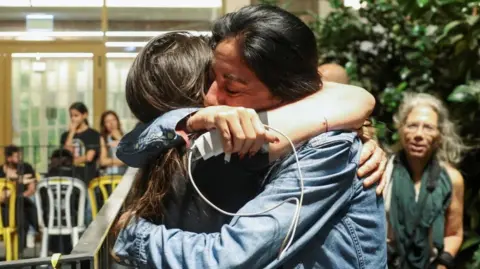 Reuters
ReutersRelatives of Israeli hostages have welcomed the deal.
Eli Sharabi, whose wife and children were killed, and whose brother Yossi's body is being held by Hamas, posted: "Great joy, can't wait to see everyone home."
The mother of hostage Nimrod Cohen posted: "My child, you are coming home."
Meanwhile in Gaza, celebrations broke out after the announcement. "Thank God for the ceasefire, the end of bloodshed and killing," Abdul Majeed abd Rabbo, a man in the southern Gaza city of Khan Younis, was quoted as saying by Reuters.
"I am not the only one happy, all of the Gaza Strip is happy, all the Arab people, all of the world is happy with the ceasefire and the end of bloodshed."

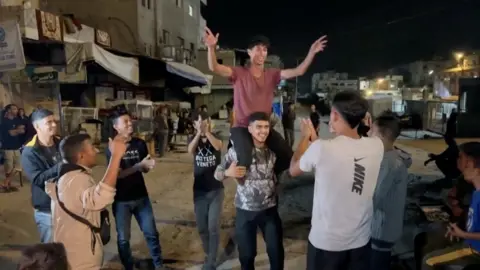 Reuters
ReutersWorld leaders have urged parties to abide by the deal.
"The suffering must end," United Nations Secretary-General António Guterres said, adding that the UN would support the "full implementation" of the deal, as well as increase its delivery of aid and its reconstruction efforts in Gaza.
UK Prime Minister Sir Keir Starmer welcomed the news, saying: "This is a moment of profound relief that will be felt all around the world, but particularly for the hostages, their families, and for the civilian population of Gaza, who have all endured unimaginable suffering over the last two years."
Australia's Prime Minister Anthony Albanese called the agreement a "much needed step towards peace" and urged parties to "respect the terms of the plan".
Lawmakers in the US have struck a cautiously optimistic tone.
"This is a first step, and all parties need to ensure this leads to an enduring end to this war," Democrat Senator Chris Coons said in an X post.
Republican James Risch, chair of the Senate Foreign Relations Committee, called it a welcome deal and said he "looks forward to learning [its] details".
With reporting by Rushdi Abualouf and Lucy Manning
US President Donald Trump's announcement of an agreement which is expected to result in the release of hostages being held in the Gaza Strip for more than two years has caused delight and relief across Israel.
The Hostages Families Forum, an organisation that has advocated for the return of Israeli captives in Gaza, expressed "profound gratitude" to Trump for what it called an "historic breakthrough".
The deal - which still must be agreed upon by Israel's war cabinet - will see the release of 20 living hostages and the bodies of 28 dead hostages in return for 250 Palestinian prisoners serving life sentences in Israeli jails and 1,700 detainees from Gaza.
So far, 148 hostages have been returned - most as part of previous ceasefire deals - 51 bodies have been recovered and eight hostages have been rescued.
Jubilant scenes have unfolded in Hostages' Square in Tel Aviv as hundreds of people gathered ahead of the deal being signed.
A crowd began clapping and dancing under US and Israeli flags - one woman holding up a sign saying: "We love Trump."
"It's a magical day," the woman said.
Another, 50-year-old Yael, cried as she watched the crowd dancing.
"I'm very excited - it's such a relief," she said. "We need to see them come back home to their families."
The mother and sister of Israeli hostage Matan Zangauker lit fireworks in celebration of the news that he would be returned home.
"They're coming back!... Matan is coming home!" Einav Zangauker said as she held her daughter.
Viki Cohen, the mother of Israeli hostage Nimrod Cohen, posted on social media: "My child, you are coming home."

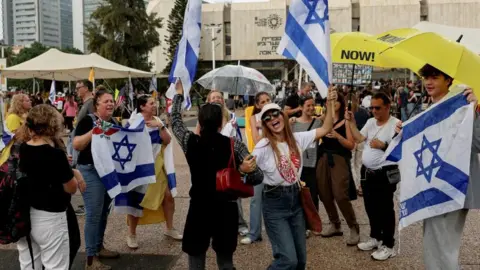 Reuters
ReutersFormer British-Israeli hostage Emily Damari celebrated with another freed hostage Romi Gonen, reciting prayers of gratitude, then toasting "L'chaim", meaning "to life". She has been campaigning for the release of her friends, twins Gali and Ziv Berman.
Their brother Liran Berman posted: "My Gali and Ziv, I love you so much. You're coming home."
Gil Dickman's cousin Carmel Gat was taken hostage on 7 October 2023, and her body recovered from a tunnel in Gaza almost a year later. He has been joining other hostage families in pushing for a deal that brings the return of all those still being held in Gaza.
"I can't quite believe this is actually happening. We've been waiting for so long and here it is," he said.
He said he felt "broken" that Carmel will not be among those returning home but was "glowing with joy for the families of the hostages who are finally coming back".

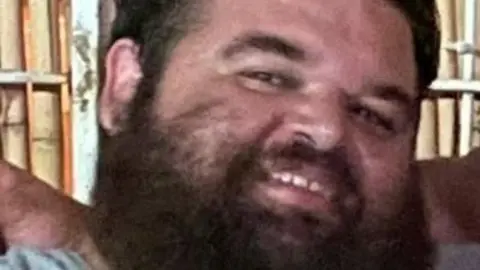 Reuters
ReutersDalia Cusnir, whose brother-in-law Eitan Horn remains captive in Gaza, said she felt like she was living "in a dream".
"We're more than grateful to President Trump and everything he has done for us. We feel like it might be the beginning of the end of this nightmare, and hugging Eitan feels closer than ever," she said.
But she cautioned that it was still too soon to celebrate.
"Until the last hostage is here, we're not opening the champagne. We're going to keep fighting... until the end," she said.
"So many things can happen until the last moment so this is why we're being so, so careful. We just want to thank everyone who was involved in the efforts and make sure this agreement is done... We will celebrate only once we have the last hostage back home."
Eitan was taken from kibbutz Nir Oz in southern Israel along with his brother Iair, who was released from captivity in a ceasefire deal earlier this year.

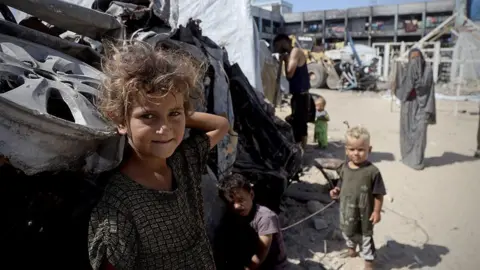 Anadolu via Getty Images
Anadolu via Getty ImagesPalestinians in Gaza have celebrated the agreement of a ceasefire and hostage release deal - but many fear confronting the grief that has built up over two years of war.
"This morning, when we heard the news about the truce, it brought both joy and pain," 38-year-old Umm Hassan, who lost his 16-year-old son during the war, told the BBC.
"Out of joy, both the young and the old began shouting," he said. "And those who had lost loved ones started remembering them and wondering how we would return home without them."
Mr Hassan added: "Every person who lost someone feels that sorrow deeply and wonders how they'll return home."
The deal announced by US President Donald Trump - which still must be agreed by Israel's war cabinet - will see the release of 20 living hostages and the bodies of 28 dead hostages in return for 250 Palestinian prisoners serving life sentences in Israeli jails and 1,700 detainees from Gaza.
It is the first phase of a 20-point peace plan that could lead to an end to the war - though the latter phases still need to be negotiated.
"We, the civilians, are the ones who've suffered - truly suffered," Daniel Abu Tabeekh, from the Jabalia refugee camp, told the BBC.
"The factions don't feel our pain. Those leaders sitting comfortably abroad have no sense of the suffering we're enduring here in Gaza."
"I have no home," he said. "I've been living on the streets for a year and a half."
Israel launched the war in Gaza in response to the Hamas attacks on 7 October 2023, when around 1,200 people, mostly Israeli civilians, were killed and 251 others taken hostage.
Israel's offensive has killed more than 67,000 Palestinians, most of whom are civilians, according to the territory's Hamas-run health ministry. Its figures are seen as reliable by the UN and other international bodies.
More than 90% of Gaza's housing has been damaged or destroyed, according to the UN.
"God rewarded us for our patience," said Umm Nader Kloub from northern Gaza, who lost seven relatives during the war, including her sons.
"God willing, he will help [the negotiators] and allow us all to return to our homes, and for their hostages to return safely," she said. "We don't want war."
Mousa, a doctor in Deir al-Balah in the centre of the Strip, said: "We have lost a lot during the two years of war. The Gaza Strip is destroyed. A difficult time still awaits us, but the important thing is we hope to be safe."
As news of a possible ceasefire deal broke over the weekend, Husam Zomlot, the head of the Palestinian mission to the UK, told the BBC: "The worst part in the last two years, is that while you are losing loved ones, your relatives, your friends, your neighbours, you are unable to allow yourself to grieve, or to feel the deep sadness and to process your human feelings.
"Because your main focus is to try and stop what's happening."
He added: "When our people and our families were being killed, the feeling was: how do you stop this? How do you bury your dead and how do you tend to your wounded?
"But after the event, which I hope to be very soon, the main feeling will be grief, mourning, and a deep, deep sense of loss. Because what we've lost is huge."

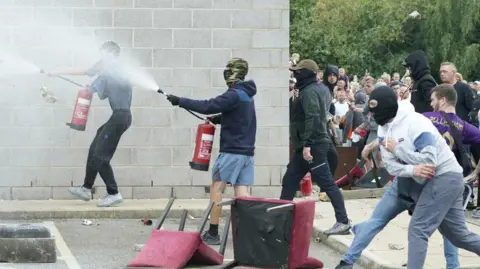 PA Media
PA MediaThe total number of hate crimes recorded by police in England and Wales has risen for the first time in three years, including increases in race and religiously motivated offences, government figures suggest.
Religious hate crimes targeted at Muslims rose by 19%, with a spike following the Southport murders and riots that followed last summer, the Home Office said.
The number of hate crimes directed at Jewish people fell by 18% in the year to March, but these figures exclude those recorded by the Met Police.
Home Secretary Shabana Mahmood said Jewish and Muslim communities "continue to experience unacceptable levels of often violent hate crime".

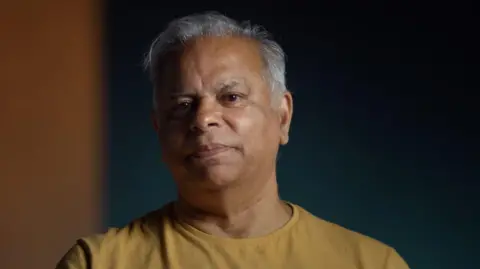
"Today's hate crime statistics show that too many people are living in fear because of who they are, what they believe, or where they come from," she said.
"I will not tolerate British people being targeted simply because of their religion, race, or identity."
Mahmood said the government had increased police patrols at synagogues and mosques following an attack on a synagogue in Manchester last week.
"We stand with every community facing these attacks and will ensure those who commit hate crimes face the full force of the law," she said.
The Met separately showed 40% of all religious hate crimes were targeted at Jewish people in the past year.
The total number of race hate crimes increased by 6% in the year to March.
In total, excluding the Met, there were 115,990 hate crime offences recorded by police in the year ending March 2025, up 2% from 113,166 for the previous 12 months.
A hate crime is an offence targeting someone's race, religion, sexual orientation, transgender identity or disability.
The hate crimes figures, supplied by the 43 territorial police forces across England and Wales and British Transport Police, recorded falls in hate crime in three other groups including sexual orientation (down 2%), disability (down 8%) and transgender (down 11%.)
There were 137,550 hate crimes recorded by the police in England and Wales including the Met, but the department said the change in recording meant the figures were not directly comparable year-on-year.
The latest figures do not yet include recent events such as unrest following protests outside of asylum hotels and reports of hate crimes at anti-immigration rallies.
Suresh Grover, founder of the anti-racist charity The Monitoring Group, said the figures do not give the full picture of hate crime experienced by some communities.
"Your colour has become your passport or your nationality".
He added that the victim's "first contact" with the police is absolutely critical and if they do not "respond in a speedy way, in a sensitive way and in a way that considers their safety as paramount, everything falls backwards and you lose those people in the statistical data that exists".
"Worse still, you lose people who continue to suffer in silence."
Imam Qari Asim, co-chairman of the British Muslim Network, said: "Whether it is Islamophobia, antisemitism or any form of bigotry, we must confront it together - with unity and courage, not silence."

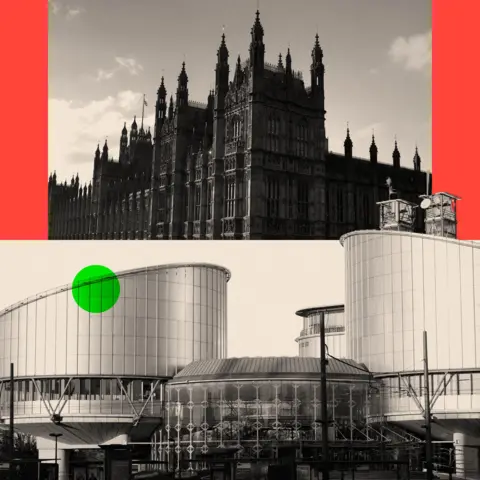 BBC
BBCLast week Kemi Badenoch announced that the Conservative Party would take the UK out of the European Convention of Human Rights if they won the next election.
"I have not come to this decision lightly," the Tory leader said. "But it is clear that it is necessary to protect our borders, our veterans, and our citizens."
Her words came on the eve of the party's annual conference, at a time when the Conservatives are under enormous pressure from Reform UK.
Nigel Farage's party also wants out of the ECHR, as well as other international treaties that he thinks stand in the way of curbing illegal immigration. Liberal Democrat leader Sir Ed Davey, meanwhile, has been just as strident the other way.
"Kemi Badenoch has chosen to back Nigel Farage and join Vladimir Putin," he declared - adding "this will do nothing to stop the boats or fix our broken immigration system".

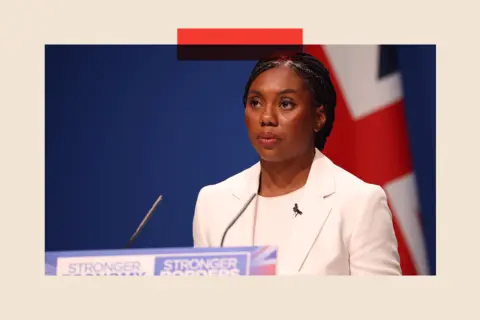 EPA
EPAPrime Minister Sir Keir Starmer has weighed in, though he hovers somewhere in between. He told the BBC he does not want to "tear down" human rights laws, but backs changing how international law is interpreted to stop unsuccessful asylum seekers blocking their deportation.
But while strongly-worded opinions over whether or not to pull out of the treaty make for easy headlines, the consequences are deeply complicated. Even Badenoch acknowledged last year that leaving would not be a "silver bullet" for tackling immigration.
So how is it that such a nuanced issue has been reduced to a political hot potato?
It was back in 2011 - not far into David Cameron's tenure as prime minister - that this issue came to the forefront of domestic politics.
It centred around the case of John Hirst, a man convicted of manslaughter, who argued the UK's blanket ban on prisoners voting in any circumstances was a breach of human rights. In 2005 Strasbourg had ruled in his favour. It essentially said the UK's policy was too black and white.
Cameron's Labour predecessors Tony Blair and Gordon Brown dodged the political bullet of being seen to give in to the court.
But when the relatively new Tory PM said he felt "physically ill" at the prospect of giving jailed criminals the vote, his soundbite propelled the ECHR to the heart of public consciousness.

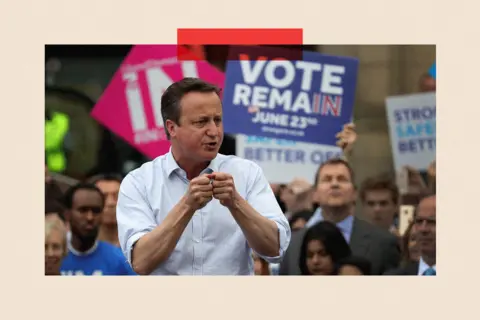 Getty Images
Getty ImagesThe ECHR had been largely drafted by a British team and aimed to impose on post-fascist Europe a "never-again" package of legal rights.
Its content drew heavily on historic laws - for example the concept of Habeas Corpus (banning unlawful detention), can be seen in the ECHR's Article 5.
Officially, the European Court of Human Rights in Strasbourg polices those rights. And when it rules that a country is in breach, the member states come together to find a way of fixing the problem in the Council of Europe (nothing to do with the EU).
But in the UK, there is also the Human Rights Act, which means ECHR cases can be dealt with by its own judges.
Disputes between UK courts and Strasbourg can be worked through too - what happened following the John Hirst case is testament to this.
In 2017, ministers allowed offenders who had been released on licence the right to vote - but made clear that Parliament would never allow votes for criminals still in prison cells. The Council of Europe closed the case. And just weeks ago the Strasbourg court threw out a fresh attempt by a prisoner to re-open the issue.
Yet it was the original clash, together with Cameron's comments in 2011, that stuck in many minds.

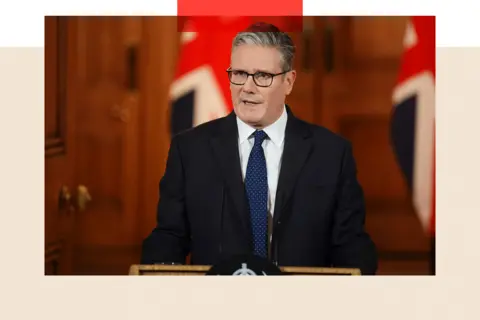 PA Media
PA MediaAdding fuel to the fire that same year, Theresa May - home secretary at the time - shared a story during party conference about a Bolivian man who avoided deportation because of his pet cat.
This illustrated the problem with human rights laws, she argued.
Only the story, as May told it, wasn't entirely correct, according to England's top judges.
The Home Office indeed wanted to send the man home as an illegal immigrant. And the cat - called Maya - had featured in the man's appeal. But that was only a tiny part of the detailed evidence he provided.
A spokesperson for the Judicial Office at the Royal Courts of Justice, which issues statements on behalf of senior judges, said at the time that the cat was "nothing to do with" the eventual judgement, which allowed the man to stay.
Yet the pet became a source of unintentional humour - and when a judge cracked a joke about the cat no longer needing to fear adapting to Bolivian mice, the case took on a life of its own.
By that autumn, a mood had begun to take hold about human rights that, 14 years later, has culminated in the Conservatives pledging to leave the ECHR.
Richard Ekins KC, a professor at the University of Oxford, is a staunch critic of the ECHR on the basis that membership in his view compromises UK sovereignty.
"But there is a more fundamental problem," he argues. "And the fundamental problem can be observed by paying attention to what the court has been doing, which really is quite openly to expand the Convention's reach over time."
He references a case last year, where the court ruled that Switzerland had breached human rights by failing to tackle climate change.
The incredibly complex judgement was celebrated by campaigners as a game-changer - but a British judge, Tim Eicke KC, said the majority on the panel had "gone beyond what it is legitimate and permissible for this court to do".

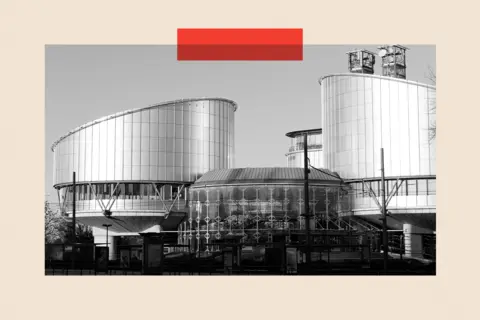 Getty Images
Getty Images"The judgment… imposes very far reaching, but also open ended and obscure obligations on member states," argues Prof Ekins.
"Domestic courts are going to be invited to apply the European Court's new approach to discipline, supervise [and] control climate policy, which obviously is a highly complicated and tangled set of considerations that intersect with social policy, economic policy, foreign policy."
This is the heart of his argument: a court completely divorced from the political will of the British people is now making the UK do things that are far beyond its original remit.
"It's incompatible - its intention at least - with parliamentary democracy," he argues.
Nowhere is the allegation of overreach stronger in British politics than in Reform's claim that the ECHR is to blame for problems with the UK's migration system.
Yet the evidence supporting this claim is often anecdotal and complex - as was the case with Maya the cat.
A study of media stories about the ECHR by the University of Oxford's Bonavero Institute for Human Rights found that fewer than 1% of all foreign criminals who have appealed against their deportation in the UK have won their case on human rights grounds.
When cases went as far as Strasbourg, the court tended to throw them out.

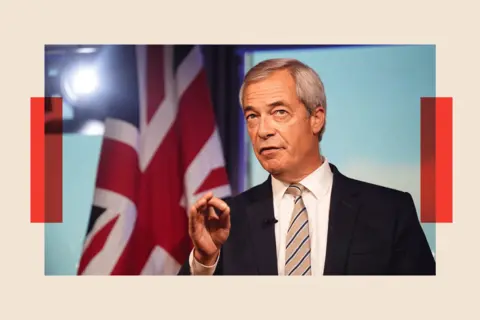 PA Media
PA MediaThat's not to say there are no issues at all.
Lord Jonathan Sumption, the former Supreme Court judge, believes that some decisions by immigration tribunal judges have become "extravagant" and far removed from the original boundaries of the right to family life.
"I have no problem about the text of the Convention," he says. "I do have a problem about the unlimited expansion which it's undergone at the hands of the Strasbourg Court.
"It's unfortunate that the whole issue has been hijacked by the question of immigration.
"I think that it will make some difference to the ability to keep people out or deport them if we are not members of the ECHR. But I think the extent that it will make a difference is not widely understood - and has been greatly exaggerated."
So, would leaving the ECHR really "stop the boats", to use Rishi Sunak's phrase?
"The number one problem about deporting illegal immigrants, first of all, is finding a place which will take them and which is not unsafe," argues Lord Sumption.
"And secondly, [there is] the Refugee Convention. It doesn't require us to take in asylum seekers. It does require us to adjudicate on their claims and give them certain rights once they've got here, even if they got here illegally.
"The ECHR is certainly an additional difficulty, but not as great a difficulty, as is suggested."

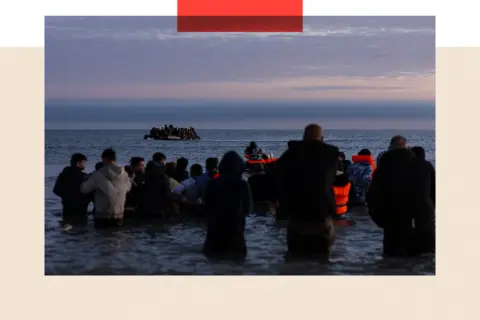 Getty Images
Getty ImagesThe UK government has already promised to devise clearer and stricter rules that will tell immigration officials and judges how to interpret the right to family life.
"I think it is a runner," argues Sir Jonathan Jones, who was the Treasury Solicitor until 2020. This, he believes, could be the best way forward - particularly around the definition of the ECHR's Article 8, which guarantees the right to, among other things, family life.
"It's legitimate for the government to say we will take a tighter view, as a proper, reasoned, good faith attempt to rein in what we think Article 8 covers and what it doesn't."
But Alex Chalk, the last Conservative Lord Chancellor before Labour won power, argues that the UK government needs to seek reform faster.
"The ECHR is not holy writ," he told the BBC during the Conservative party conference. "This government should be moving much more quickly to seek urgent reform. [It] should have been saying, look, we want to lead on this to do this in six weeks.
"The US Constitution was drafted in 15 weeks or so. This really can be done."
Human rights lawyer Harriet Wistrich is concerned about what could be lost if the UK does leave the ECHR. It has, she argues, been at the forefront of challenging the state's treatment of victims of awful abuses.
"We were able to hold Greater Manchester Police accountable on behalf of Rochdale grooming gang victims through civil [damages] proceedings.
"The Hillsborough inquests were possible by having Article 2 [the right to life] inquiries into deaths, where you want to examine what went wrong and what the state could have done differently.
"If we withdraw fully… it's those rights that are going to suffer," says Ms Wistrich, who is also the founder of the Centre for Women's Justice.

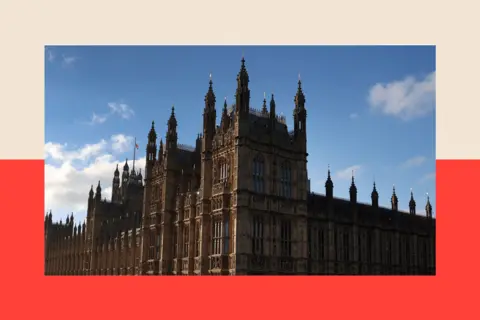 EPA
EPABeyond legal battles at home, there are big international questions too around leaving.
The 1998 Belfast Agreement, the cornerstone of peace in Northern Ireland, and the post-Brexit deal with the European Union placed respect for human rights law at their centre. Critics of withdrawing from the EHCR predict both could come crashing down.
But Professor Ekins believes that you can have human rights safeguards without a supranational court overseeing all nations.
He and colleagues wrote a detailed proposal on Northern Ireland that argue the historic arrangements don't require the UK to remain in the ECHR, providing it honours human rights and cross-community power-sharing arrangements by other means.

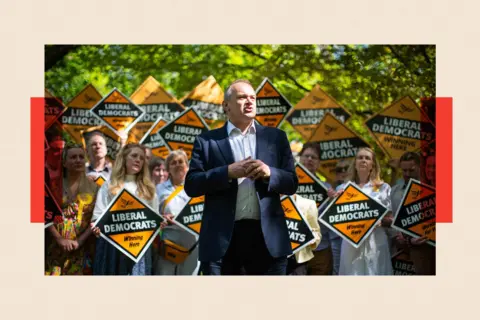 James Manning/PA Wire
James Manning/PA WireThe issues in Northern Ireland and the Republic could, however, go deeper. Sir Jonathan Jones for one is sceptical about how leaving the ECHR would go down in both places - because the ECHR's role in the agreement was to demonstrate to a lot of people who do not trust the British state that there are laws in place to protect them.
"The thing about the Convention is that it constrains governments, and it constrains the way that governments can treat minorities and people it doesn't like," he says.
"If we were out of the ECHR, you wouldn't have that constraint."
Alex Chalk warns there could be an international price to leaving, too. There is value, he says, in sitting at the Council of Europe and raising issues with French and German counterparts at international conferences.
"You should try to reform before you yank your way out because inevitably there could be cost to doing so," he argues.
But ultimately, he adds, "this is a matter of politics more than it is of law".
Top image: Getty Images
BBC InDepth is the home on the website and app for the best analysis, with fresh perspectives that challenge assumptions and deep reporting on the biggest issues of the day. And we showcase thought-provoking content from across BBC Sounds and iPlayer too. You can send us your feedback on the InDepth section by clicking on the button below.

 Rustavi 2
Rustavi 2The case of a British teenager accused of drug smuggling in Georgia has been delayed to "finalise a plea bargain".
Appearing at Tbilisi City Court, Bella Culley, 19, from Billingham, Teesside, had previously been told she could face up to 15 years in jail or life imprisonment if convicted.
It is understood her family has raised enough money to significantly reduce any jail time imposed.
Malkhaz Salakaia, representing heavily pregnant Miss Culley, said he planned to appeal to the president of Georgia to pardon her after finalising the plea deal.
Judge Giorgi Gulashvili said prosecution and defence teams needed more time to finalise the sum needed for Miss Culley's release.
The hearing was attended by the teenager's mother and grandmother.
At a previous hearing in September, the family was told a "substantial" amount of money would lead to the teenager's release.
The case has been postponed until October 28.

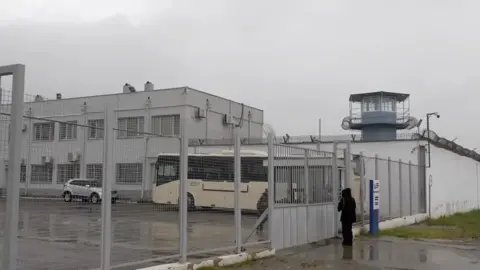 Rayhan Demytrie/BBC
Rayhan Demytrie/BBCMiss Culley initially went missing in Thailand before being arrested at Tbilisi International Airport on 10 May.
It is understood she arrived on a flight from Sharjah, in the United Arab Emirates.
Georgian Police said officers seized narcotic drugs from a travel bag.
Miss Culley was detained for months while the prosecution investigated where 12kg (26lbs) of marijuana and 2kg (4.4lbs) of hashish came from, and whether she was planning to hand them over to someone else.
At a hearing in July she pleaded not guilty to charges of possession and trafficking illegal drugs and claimed she had been "forced to do this through torture".
"I just wanted to travel," she said. "I am a good person. I am a student at university. I am a clean person. I don't do drugs."

 Bauer-Griffin/GC Images/Getty Images
Bauer-Griffin/GC Images/Getty Images"It's not about him, it's about me," declares Victoria Beckham ("him" being her husband Sir David Beckham).
And that's exactly what we get in a new three-part documentary, which drops on Netflix on Thursday.
The former Spice Girl and fashion entrepreneur, 51, is determined to tell her own story – two years after former England captain Sir David, 50, released his own, hugely successful TV series.
The episodes take us inside Victoria's pop career, family life, struggles to reinvent herself and preparation for a major show at Paris Fashion Week.
We also learn about the serious financial troubles her fashion business faced, and how she feared she might "lose everything".
There are contributions from famous friends including Eva Longoria, and fashion titans such as Dame Anna Wintour and Donatella Versace.
Here are our main takeaways from her documentary.

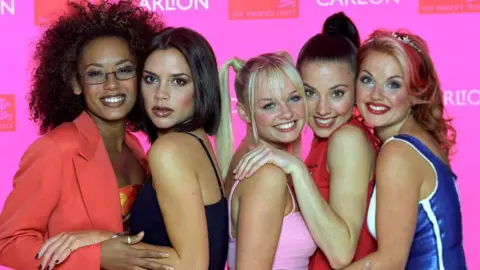 Shutterstock
ShutterstockLady Beckham achieved dizzying fame in the Spice Girls, so it's hard to believe that at school, she was "that uncool kid" who didn't fit in.
"I was definitely a loner at school", she says, explaining she was bullied.
The Spice Girls came together in 1994, after Mel B, Mel C, Emma Bunton, Geri Halliwell and Victoria responded to an advert for candidates.
After the release of their chart-topping debut single Wannabe in 1996, "Spice mania" swept the planet, with their self-styled "Girl Power" mantra - a brand of female empowerment that made them a global pop culture phenomenon.
Lady Beckham credits her bandmates for making her "more lighthearted, more fun" and says it was the first time she felt popular.
She still had to face negative headlines about her weight, and discusses having an eating disorder. She says she never talked about it publicly, or even very much with her parents, but that it made her become “very good at lying".
But Lady Beckham says the other Spice Girls made her "feel good enough" about being herself. It's a message she continues to instil in her daughter Harper, 14.
"I tell Harper every day, be who you are," she says.

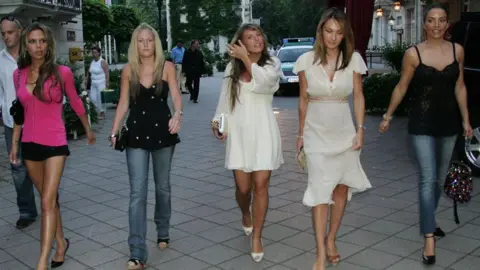 Alamy
AlamyGeri Halliwell left the Spice Girls in 1998 and the group split up in 2001.
Lady Beckham says she found the transition "really, really difficult".
She carried on making music, but the criticism she received "really hurt".
Then came the infamous WAG period. Pictures of Victoria and other wives-and-girlfriends supporting their footballer partners in the German town of Baden-Baden in 2006 were plastered all over the tabloids.
"It was fun," says Lady Beckham of that time in her life.
But she now concedes there was an "element of attention seeking" to it all. "I was trying to find myself, I felt incomplete, sad, frozen in time maybe," she says.
After the family moved to the US, Lady Beckham decided she wanted to work in fashion.
But to do that, she knew she had to shed her other personas – the Spice Girl, the WAG. "I buried those boobs in Baden-Baden," she says.
Lady Beckham is strikingly honest about the struggles her fashion business faced.
She says people didn't see her as "cool at all", and that a lot of people refused to take her seriously.
And Vogue giant Dame Anna cements that view, when she says of Victoria's fashion aspirations: "I thought maybe this was a hobby. I didn't quite believe it."
We see the growth of Victoria Beckham Ltd but also the serious financial troubles it faced. Sir David says he didn't think her business would survive, while Lady Beckham agrees.
"I almost lost everything and that was a dark, dark time," she says. "I used to cry before I went to work every day because I felt like a firefighter."

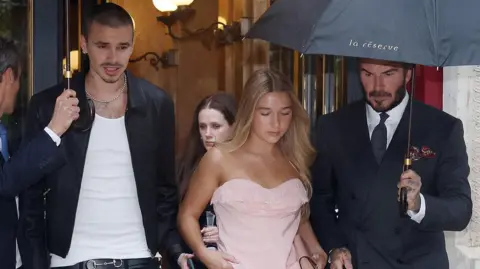 Getty Images
Getty ImagesShe says her firm was "tens of millions in the red".
In a later scene, her voice breaks, and she wells up in tears, when she recalls how Sir David stepped in to help her business out.
But the series also shows her turn things around, and we see her pull out all the stops in the run-up to her triumphant Spring/Summer show at Paris Fashion Week in September 2024.
Supermodel Gigi Hadid walked for her, wearing a striking emerald green gown. Dame Anna is shown in attendance, and, in an earlier clip, says Lady Beckham "totally proved us wrong".
Today, Victoria's business has offices in London and New York, with its flagship store in Mayfair, London. The brand's products are in 230 stores across 50 countries around the world, according to the company's website.

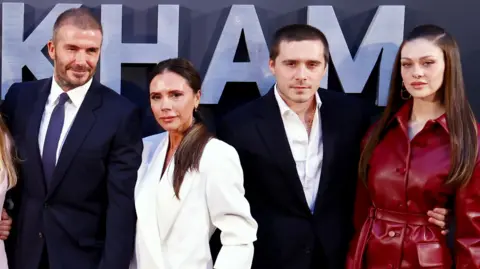 EPA
EPAThe couple's eldest son, 26-year-old Brooklyn, gets a few mentions in the show and appears briefly. Lady Beckham brings him up in conversation, when discussing the morning sickness she faced while pregnant with him and performing with the Spice Girls.
But for the past few months, much of the online interest around the Beckhams has focused on reports that Brooklyn and his wife Nicola have fallen out with the rest of the family.
The couple were absent from David Beckham's 50th birthday celebrations and did not post a birthday message online, fuelling the intrigue.
Nicola has in the past denied there was a feud in the family. Sir David and Lady Beckham have never acknowledged the rumoured rift, and declined to comment when asked by BBC News.
We did get a hint on the topic recently from Victoria, who told the Sunday Times how she felt Liam and Noel Gallagher's reconciliation must have made their mother "so happy".
"As a mum, that must be... she must feel so happy to see her boys getting on," she said.
Showbiz reporter Catrina Rose notes there was “no hint” of any alleged feud in the series.
"Victoria's setting a lot of records straight here, but she's not being drawn on this particular topic."
Lady Beckham's pout became her defining look in the 1990s. But in the new series, she admits there's a deeper reason as to why she never smiles.
"The minute I see a camera, I change," she says.
"The barrier goes up, my armour goes on, and that's when, you know, the miserable cow that doesn't smile - that's when she comes out. And I'm so conscious of that."
She adds that she would "rather not be that person" and wishes she had the confidence to walk out in front of cameras and smile.
Elsewhere, she insists that she does actually smile.
"I've looked miserable for all these years because when we stand on the red carpet, this guy has always gone on the left," she says, gesturing at Sir David.
"When I smile, I smile from the left, because if I smile from the right, I look unwell. So consequently I'm smiling on the inside, but no one ever sees it, so that's why I look so moody."
The programme is filled with small details about the Beckhams' relationship – many of which we didn't know before.
For example, Sir David starts a blender when he doesn't want to listen to Victoria (so she says, anyway).
The pair have fond memories of their whirlwind romance in the 1990s, which led to them getting married and having a baby within two years.
Sir David reflects that his parents - and his manager - would have preferred him to marry a local girl who stayed in Manchester, where he was playing for Manchester United. "But I didn't want that," he says, opting instead for globe-trotting celebrity Victoria.
"I was so excited, I wanted everyone to know I was dating Posh Spice," the former England captain says.
Lady Beckham, for her part, says she was never a young girl dreaming of getting married or becoming a mum. "It wasn't until I met David that those things even occurred to me," she says.
In the final episode, which was filmed before Sir David's 50th birthday this year, the pair get reflective about everything they have achieved, and what lies ahead for them.
"Success, it feels good, I'm not going to lie," says Victoria. "I've still got a lot that I want to do."
Sir David, for his part, seems to have something else on his mind.
"Now we're both, well I'm almost 50, you're 51, what's next? Another baby?," David asks his wife.
Victoria laughs. "Another baby? My God. No."
Victoria Beckham, a three-part documentary series, is available now on Netflix.
US President Donald Trump has announced that Israel and Hamas have "both signed off" on the first phase of a peace plan for Gaza.
"This means that ALL of the Hostages will be released very soon, and Israel will withdraw their Troops to an agreed upon line as the first steps toward a Strong, Durable, and Everlasting Peace," Trump wrote on Truth Social.
The announcement comes after three days of indirect talks in Egypt - mediated by officials from Egypt, Qatar, Turkey and the US - aimed at bringing an end to the two-year conflict.
Both Israel and Hamas also confirmed an agreement had been reached.
However, Trump's post did not provide clarity on other known sticking points in negotiations - notably the disarmament of Hamas and the future governance of Gaza.
In a post on X, Israeli Prime Minister Benjamin Netanyahu called it a "great day", adding that he would "convene the government tomorrow to ratify the agreement and bring all of our precious hostages home".
Hamas confirmed that the agreement included an Israeli withdrawal from Gaza and a hostage-prisoner exchange.
The group also called on Trump, the guarantor countries and other Arab states to compel Israel "to fully implement the agreement's requirements".
A senior White House official told CBS, the BBC's US news partner, that "our assessment is that hostages will begin getting released on Monday".
Qatari Foreign Minister Majed al-Ansari said more details would be announced later, adding that the agreement would "lead to ending the war, the release of Israeli hostages and Palestinian prisoners, and the entry of aid".
Earlier on Wednesday, expectations that a deal could be imminent were heightened after US Secretary of State Marco Rubio entered an event with Trump and handed him a note.
The message appeared to ask that Trump approve a Truth Social post about Gaza so that "you can announce first".
Trump said that note informed him that "we are very close to a deal". He exited the room shortly thereafter, saying he had to focus on the Middle East.
Gaza's Hamas-run health ministry said on Wednesday that Israeli fire had killed at least eight people over the previous 24 hours – the lowest death toll it has reported in the past week.
Hospitals said two people had been killed on Wednesday while trying to collect food from aid distribution centres in central and southern Gaza.
The Israeli military, meanwhile, said its troops had killed "several terrorists" who attempted to attack their position in Gaza City.
Israel launched a military campaign in Gaza in response to the 7 October 2023 attack, in which Hamas-led gunmen killed about 1,200 people and took 251 others as hostages.
At least 67,183 have been killed by Israeli military operations in Gaza since then, including 20,179 children, according to the territory's health ministry. Its figures are seen as reliable by the UN and other international bodies, although Israel disputes them.
The ministry has said another 460 people have died from the effects of malnutrition since the start of the war, including 182 since a famine was confirmed in Gaza City in August by the UN-backed Integrated Food Security Phase Classification (IPC).
Netanyahu has repeatedly denied starvation is taking place in Gaza and said Israel was facilitating deliveries of food and other aid.

 Anadolu via Getty Images
Anadolu via Getty ImagesPalestinians in Gaza have celebrated the agreement of a ceasefire and hostage release deal - but many fear confronting the grief that has built up over two years of war.
"This morning, when we heard the news about the truce, it brought both joy and pain," 38-year-old Umm Hassan, who lost his 16-year-old son during the war, told the BBC.
"Out of joy, both the young and the old began shouting," he said. "And those who had lost loved ones started remembering them and wondering how we would return home without them."
Mr Hassan added: "Every person who lost someone feels that sorrow deeply and wonders how they'll return home."
The deal announced by US President Donald Trump - which still must be agreed by Israel's war cabinet - will see the release of 20 living hostages and the bodies of 28 dead hostages in return for 250 Palestinian prisoners serving life sentences in Israeli jails and 1,700 detainees from Gaza.
It is the first phase of a 20-point peace plan that could lead to an end to the war - though the latter phases still need to be negotiated.
"We, the civilians, are the ones who've suffered - truly suffered," Daniel Abu Tabeekh, from the Jabalia refugee camp, told the BBC.
"The factions don't feel our pain. Those leaders sitting comfortably abroad have no sense of the suffering we're enduring here in Gaza."
"I have no home," he said. "I've been living on the streets for a year and a half."
Israel launched the war in Gaza in response to the Hamas attacks on 7 October 2023, when around 1,200 people, mostly Israeli civilians, were killed and 251 others taken hostage.
Israel's offensive has killed more than 67,000 Palestinians, most of whom are civilians, according to the territory's Hamas-run health ministry. Its figures are seen as reliable by the UN and other international bodies.
More than 90% of Gaza's housing has been damaged or destroyed, according to the UN.
"God rewarded us for our patience," said Umm Nader Kloub from northern Gaza, who lost seven relatives during the war, including her sons.
"God willing, he will help [the negotiators] and allow us all to return to our homes, and for their hostages to return safely," she said. "We don't want war."
Mousa, a doctor in Deir al-Balah in the centre of the Strip, said: "We have lost a lot during the two years of war. The Gaza Strip is destroyed. A difficult time still awaits us, but the important thing is we hope to be safe."
As news of a possible ceasefire deal broke over the weekend, Husam Zomlot, the head of the Palestinian mission to the UK, told the BBC: "The worst part in the last two years, is that while you are losing loved ones, your relatives, your friends, your neighbours, you are unable to allow yourself to grieve, or to feel the deep sadness and to process your human feelings.
"Because your main focus is to try and stop what's happening."
He added: "When our people and our families were being killed, the feeling was: how do you stop this? How do you bury your dead and how do you tend to your wounded?
"But after the event, which I hope to be very soon, the main feeling will be grief, mourning, and a deep, deep sense of loss. Because what we've lost is huge."
US President Donald Trump's announcement of an agreement which is expected to result in the release of hostages being held in the Gaza Strip for more than two years has caused delight and relief across Israel.
The Hostages Families Forum, an organisation that has advocated for the return of Israeli captives in Gaza, expressed "profound gratitude" to Trump for what it called an "historic breakthrough".
The deal - which still must be agreed upon by Israel's war cabinet - will see the release of 20 living hostages and the bodies of 28 dead hostages in return for 250 Palestinian prisoners serving life sentences in Israeli jails and 1,700 detainees from Gaza.
So far, 148 hostages have been returned - most as part of previous ceasefire deals - 51 bodies have been recovered and eight hostages have been rescued.
Jubilant scenes have unfolded in Hostages' Square in Tel Aviv as hundreds of people gathered ahead of the deal being signed.
A crowd began clapping and dancing under US and Israeli flags - one woman holding up a sign saying: "We love Trump."
"It's a magical day," the woman said.
Another, 50-year-old Yael, cried as she watched the crowd dancing.
"I'm very excited - it's such a relief," she said. "We need to see them come back home to their families."
The mother and sister of Israeli hostage Matan Zangauker lit fireworks in celebration of the news that he would be returned home.
"They're coming back!... Matan is coming home!" Einav Zangauker said as she held her daughter.
Viki Cohen, the mother of Israeli hostage Nimrod Cohen, posted on social media: "My child, you are coming home."

 Reuters
ReutersFormer British-Israeli hostage Emily Damari celebrated with another freed hostage Romi Gonen, reciting prayers of gratitude, then toasting "L'chaim", meaning "to life". She has been campaigning for the release of her friends, twins Gali and Ziv Berman.
Their brother Liran Berman posted: "My Gali and Ziv, I love you so much. You're coming home."
Gil Dickman's cousin Carmel Gat was taken hostage on 7 October 2023, and her body recovered from a tunnel in Gaza almost a year later. He has been joining other hostage families in pushing for a deal that brings the return of all those still being held in Gaza.
"I can't quite believe this is actually happening. We've been waiting for so long and here it is," he said.
He said he felt "broken" that Carmel will not be among those returning home but was "glowing with joy for the families of the hostages who are finally coming back".

 Reuters
ReutersDalia Cusnir, whose brother-in-law Eitan Horn remains captive in Gaza, said she felt like she was living "in a dream".
"We're more than grateful to President Trump and everything he has done for us. We feel like it might be the beginning of the end of this nightmare, and hugging Eitan feels closer than ever," she said.
But she cautioned that it was still too soon to celebrate.
"Until the last hostage is here, we're not opening the champagne. We're going to keep fighting... until the end," she said.
"So many things can happen until the last moment so this is why we're being so, so careful. We just want to thank everyone who was involved in the efforts and make sure this agreement is done... We will celebrate only once we have the last hostage back home."
Eitan was taken from kibbutz Nir Oz in southern Israel along with his brother Iair, who was released from captivity in a ceasefire deal earlier this year.
The ceasefire and hostage deal between Israel and Hamas, announced after intense negotiations in Egypt, is a long-awaited breakthrough that brings them closer to ending the two-year-old war in Gaza.
But, despite the momentum, there is no guarantee that this will happen.
The main difference in these efforts has been the personal involvement of President Donald Trump, who has put pressure not only on Hamas but also on Israel for an agreement. This is a major diplomatic victory for someone who wants to be seen as the man who ended the war – and, in the process, be rewarded for it.
Israel launched the war in Gaza in response to the Hamas attacks on 7 October 2023, when around 1,200 people were killed, mostly Israeli civilians, and 251 were taken hostage.
Israel's military offensive has killed more than 67,000 Palestinians, mostly civilians and including more than 18,000 children, according to the territory's Hamas-run health ministry. Its figures are seen as reliable by the UN and other international bodies. It has destroyed most of the territory and led to a catastrophic humanitarian crisis.
What has been agreed is the first phase of a plan the president announced at the White House last week alongside the Israeli prime minister, Benjamin Netanyahu, who has been accused of sabotaging efforts for a deal in the past.
This time, Trump, reportedly impatient and irritated with Netanyahu, appears to have used the power only the Americans have to influence Israel, leaving the prime minister with no option other than to engage with the process.
Threatened by Trump with "complete obliteration", Hamas was under intense pressure too. Arab and Muslim countries embraced the president's plan, and there was heavy involvement from Egypt, Qatar and Turkey in the negotiations.
Details of the deal have not yet been published but the outline is that the remaining hostages will be freed – the 20 believed to be alive at once, possibly as soon as Sunday, while the remains of up to 28 deceased captives will be returned in stages.
Hundreds of Palestinian prisoners will be released from Israeli jails, Israeli troops will withdraw from parts of Gaza, and there will be an increase in humanitarian aid entering the territory.
Trump has publicly expressed his desire to be awarded a Nobel Peace Prize, which will be announced on Friday, a deadline that could have guided the negotiations. On social media, he employed his usual hyperbole, calling it a "historic and unprecedented event" and the "first steps toward a strong, durable and everlasting peace".
This is, without a doubt, a significant moment but it gives no certainty that a peace deal for Gaza will happen, as crucial details still need to be worked out. They include the key Israeli demand that Hamas must disarm, the extent of the Israeli withdrawal and a plan for who will govern Gaza.
In Gaza, Palestinians celebrated the announcement in the middle of the night, hoping that this will bring an end to their suffering. In Tel Aviv, people gathered in Hostages Square, which has become a symbol of the ordeal of the captives.
Hamas knows that, by releasing the hostages, it will lose the leverage it has in negotiations. It has demanded guarantees that Israel will not resume the fighting once they have been freed - but has reasons to be suspicious: in March, Israel broke down a ceasefire and returned to war with devastating air strikes.
In Israel, however, a country exhausted by the conflict, polls have consistently suggested that most people want the conflict to end.
But Netanyahu still faces political hurdles. He relies on the support of ultranationalist ministers who have threatened to quit the coalition in the case of a deal, which could lead to the government's collapse, a concern that many suspect has led him to prolong the war. He has promised to achieve "total victory" against Hamas, and any deal will have to allow him to say he has done that.
Netanyahu has called the announcement a "diplomatic and a national and moral victory for the State of Israel". Notably, unlike Hamas, his statement did not say it would end the war.

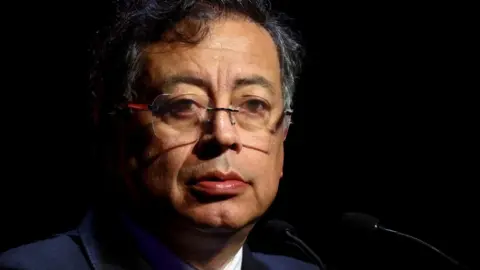 Reuters
ReutersColombian President Gustavo Petro has said that a boat recently bombed by the US was "Colombian with Colombian citizens inside", an allegation the White House called "baseless".
The US has struck at least four vessels in the Caribbean in recent weeks, killing 21 people. The US government has said the strikes in international waters were targeting "narco-traffickers".
But it has not provided evidence or details about who or what is aboard, and the strikes have attracted condemnation in countries in the region amid concerns they breach international law.
The US Senate rejected a measure on Wednesday that would have barred President Donald Trump from using military force against the boats.
Petro replied to a post on X by US Senator Adam Schiff, a Democrat, who said he would vote to block strikes against vessels in the Caribbean as some lawmakers sought to challenge the use of the armed forces in Congress.
The Colombian president said that a "new war scenario has opened up: the Caribbean".
Petro added that "indications show that the last boat bombed was Colombian with Colombian citizens inside it.
"I hope their families come forward and report it. There is no war against smuggling; there is a war for oil and it must be stopped by the world. The aggression is against all of Latin America and the Caribbean."
Petro did not provide further details about the alleged identities of those on board. The US has not commented on the identities of the individuals killed in the strikes.
The White House said in a statement that it "looks forward to President Petro publicly retracting his baseless and reprehensible statement".
It said that while the two nations had "policy differences", the US remained "committed to close co-operation on a range of shared priorities, including regional security and stability".
The US says its strikes, which began on 2 September, had targeted vessels off the coast of Venezuela that it alleges were carrying illegal drugs.
The measure considered by the Senate on Wednesday, which would have required Trump to seek congressional approval for the strikes, was rejected in a 48-51 vote.
It had been introduced by Democratic Senators Schiff and Tim Kaine. The vote broke down mostly along partisan lines.
Earlier this month, a leaked memo sent to Congress said that the US was now categorising itself as being in a "non-international armed conflict".
Framing this as an active armed conflict is likely a way for the administration to justify the use of wartime powers, including killing "enemy fighters", even if they pose no violent threat.
Trump has already designated many cartels, including in Mexico, Ecuador and Venezuela, as terrorist organisations – granting US authorities more powers in their response to them.

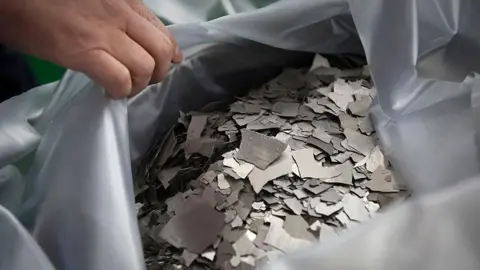 Bloomberg via Getty Images
Bloomberg via Getty ImagesChina has tightened its rules on the export of rare earths - the elements that are crucial to the manufacture of many high-tech products.
New regulations announced by the country's Ministry of Commerce formalise existing rules on processing technology and unauthorised overseas cooperation.
China is also likely to block exports to foreign arms manufacturers and some semiconductor firms.
Rare earth exports are a key sticking point in the months-long negotiations between Beijing and Washington over trade and tariffs. The announcement comes as China's President Xi Jinping and his US counterpart Donald Trump are expected to meet later this month.
Technology used to mine and process rare earths, or to make magnets from rare earths, can only be exported with permission from the government, the Ministry of Commerce said.
Many of these technologies are already restricted. China had added several rare earths and related material to its export control list in April, which caused a major shortage back then.
But the new announcement makes clear that licenses are unlikely to be issued to arms manufacturers and certain companies in the chip industry.
Chinese firms are also banned from working with foreign companies on rare earths without government permission.
China has been accused by the US and other Western countries of aiding Russia's war on Ukraine by allowing dual technology exports - materials that can be used for either civilian or military purposes - to be sent to Moscow. Beijing has repeatedly denied this.
The latest announcement also clarifies the specific technologies and processes that are restricted.
These include mining, smelting and separation, magnetic material manufacturing, and recycling rare earths from other resources.
The assembly, debugging, maintenance, repair, and upgrading of production equipment are also prohibited from export without permission, the announcement added.
This could have an impact on the US, which has a significant rare earths mining industry but lacks processing facilities.
Rare earths are a group of 17 chemically similar elements that are crucial to the manufacture of many high-tech products.
Most are abundant in nature, but they are known as "rare" because it is very unusual to find them in a pure form, and they are very hazardous to extract.
Although you may not be familiar with the names of these rare earths - like neodymium, yttrium and europium - you will be very familiar with the products that they are used in.
For instance, neodymium is used to make the powerful magnets used in loudspeakers, computer hard drives, electric car motors and jet engines that enable them to be smaller and more efficient.
China has a near monopoly on extracting rare earths as well as on refining them - which is the process of separating them from other minerals.
The International Energy Agency (IEA) estimates that China accounts for about 61% of rare earth production and 92% of their processing.
Additional reporting by Ian Tang of BBC Monitoring.

© Chester Higgins Jr./The New York Times

澳大利亚副总理兼国防部长马尔斯(Richard Marles)和印度国防部长拉杰纳特·辛格(Rajnath Singh)周四签署了一项新的双边安全协议,澳方称该协议维护了印太地区的稳定。
马尔斯通过社媒平台X表示,“今天上午,在议会大厦举行的首届澳印国防部长对话会上,与拉杰纳特·辛格进行了富有成效的会谈。这是印度国防部长12年来首次访问澳大利亚,此次访问对提升两国全面战略伙伴关系意义重大。作为顶级安全伙伴,我们同意加强各军种联合演习和多边演习中的对话、合作和复杂性”。
马尔斯办公室在一份声明中称:“澳大利亚和印度是顶级安全伙伴,我们的防务合作对维护印度-太平洋的稳定发挥了切实作用”。据悉,马尔斯和拉杰纳特·辛格签署了一项协议,其中包括建立两军联合参谋会谈的论坛和潜艇救援合作。
马尔斯在签署仪式前表示,“今天即将签署的双边协议反映了我们(澳印)防务伙伴关系的显著发展以及我们对其未来的共同愿景”。今年7月,印度首次参加在澳大利亚举行的两年一度的“护身军刀”(Talisman Sabre)多国军事演习,标志着两国防务关系更加密切。
“护身军刀”系列演习始于2005年,是美国和澳大利亚的联合演习。“护身军刀2025”共有来自美、澳、日、韩、英、法等19国超过3.5万人参加,演习区域首次延伸到澳大利亚领土之外的巴布亚新几内亚,成为该系列军演史上规模最大的一次。
印度和澳大利亚均是美日印澳四方安全对话(Quad)成员,四国外长7月份在华盛顿举行会晤,同意扩大在印度-太平洋海事安全等方面的合作。尽管印度防长12年来未曾访澳,但马尔斯却已多次访问印度参加高层会议。
澳印防长在对话会结束后通过发布联合声明表示,双方“推进了两国总理关于加强合作的长期愿景,旨在增强共同实力,维护两国安全,并为地区和平与安全作出重要贡献。他们讨论了《联合海事安全合作路线图》,以推进海事合作,并期待两国总理续签并加强《防务与安全合作联合宣言》”。
澳印防长还承诺,“通过举行年度国防部长对话会,扩大双边防务架构,加强磋商与合作。防长们欢迎签署《澳印潜艇相互救援支持与合作实施安排》。他们欢迎在2024年签署的《澳印空中加油实施安排》落实方面取得的进展。防长们强调了在信息共享方面加强合作”。
联合声明指,澳印防长“对(两国)防务伙伴关系现已扩展至所有领域表示欣慰。防长们欢迎建立联合参谋会谈机制,以此作为推进所有领域联合演习、行动和互操作性的论坛。澳大利亚欢迎印度参加2025年澳大利亚‘护身军刀’演习,并期待印度参加2027年的演习”。
此外,澳印防长“对防务演习和交流日益频繁和复杂化以及通过实施《相互后勤支持安排》而不断提升的互操作性表示赞赏。他们欢迎澳大利亚皇家空军参加2024年印度空军的‘塔朗·沙克蒂’演习,以及澳大利亚皇家海军和印度海军参与2026年的海军接触。印度欢迎澳大利亚邀请其参加‘黑钟琴’潜艇救援演习”。
联合声明亦指,“防长们重申加强与地区伙伴合作的重要性,以维护自由、开放、和平、稳定和繁荣的印度-太平洋。防长们强调,他们坚决支持本地区的航行和飞越自由、贸易畅通以及其他符合国际法,特别是1982年《联合国海洋法公约》(UNCLOS)的合法海洋使用”。
联合声明提及,双方“对澳大利亚、印度、日本和美国防务合作的持续进展表示欢迎,并强调了四方之间日益增长的战略趋同。他们重申致力于加强海域感知合作,并期待在2025年11月‘马拉巴尔’演习期间开展第二次合作活动。澳大利亚和印度表示大力支持推动四方加强海上监视合作的举措,并欢迎有机会与日本一起首次观摩2025年举行的印美‘印度合作’(Cope India)空中演习”。
马尔斯接受了拉杰纳特·辛格的邀请,将于2026年访问印度参加年度澳印国防部长对话会。
中国在十一国庆长假结束后,宣布多项出口管制措施,涉及锂电池和人造石墨负极材料相关物项、中重稀土相关物项等等。
中国商务部官网星期四(10月9日)傍晚5时一次过发布四项公告,公布对超硬材料相关物项、对部分稀土设备和原辅料相关物项、部分中重稀土相关物项,以及对锂电池和人造石墨负极材料相关物项施出口管制的决定。上述措施11月8日起正式实施。
受到出口管制的中重稀土相关物项为钬相关物项、铒相关物项、铥相关物项、铕相关物项、镱相关物项。
根据上述公告,出口经营者出口上述物项应当依照相关规定,向国务院商务主管部门申请许可。
中国商务部新闻发言人以应询答记者问的形式说,已经向有关国家和地区作了通报。
发言人称,此次列管的相关物项具有明显的军民两用属性,中国依法依规实施出口管制措施,符合国际通行做法,更好地维护了国家安全和利益,更好地履行了防扩散等国际义务。
发言人也说:“中国政府愿与各国一道维护全球产供链稳定畅通,相关措施不针对任何国家和地区,对于合法合规的出口申请,中方将在审查后予以许可。同时,中方愿通过双边出口管制对话交流机制,与相关方就出口管制政策和实践开展沟通对话,共同促进、便利合规贸易。”
中国商务部早前也宣布,对稀土相关技术,以及含有中国成分的部分境外稀土相关物项实施出口管制。
香港财经事务及库务局局长许正宇发文称,《香港家族办公室指南》星期四(10月9日)正式发布,香港将从明年起的三年里,再吸引220个家族办赴港。
许正宇当天在香港财经事务及库务局官网发文说,《香港家族办公室指南》是一份为家族办公室量身定制的全面指引,为计划在香港落户或是扩展现有业务提供了清晰的路线图。
《指南》涵盖了从策略制定、监管环境导航,到投资管理、营运效率与传承及慈善事业的实用建议。这不仅是一份指南,更是香港向全球家族办公室发出邀请,欢迎他们赴港开拓机遇。
许正宇介绍,香港家办汇自一年前启动以来,已成为推动香港家族办公室生态圈发展的强大引擎。财库局与彭博的合作,利于整合全球资源,为家族办公室提供数字知识中心、专业洞察及交流平台。香港家办汇的数字知识中心已录得超过4000次浏览,反映香港在全球财富管理领域的强大吸引力。
许正宇称,香港投资推广署成功协助超过200个家族办公室在香港设立或扩展业务,提前实现2022年《施政报告》中订下的目标。这些家族办公室为香港带来资金、人才与商业机会,推动经济多元化发展。
他指出,正如上9月《施政报告》所宣布,香港已定下新目标,将于2026年至2028年间,再吸引220个家族办公室赴港。这将进一步巩固香港作为全球资产及财富管理中心的地位,为经济注入新活力。

中国第十五届全国运动会和全国第十二届残疾人运动会暨第九届特殊奥林匹克运动会(简称十五运会和残特奥会)火种采集仪式星期四(10月9日)在广州举行。
综合新华社和中国央视新闻报道,这次火种采集活动包含“源火”采集与“圣火”点燃两大环节。活动现场,采集自深海的“源火”首度揭晓其神秘面纱。采火技术团队代表手捧“源火”盒走上舞台,这一簇来自南中国海1522米深处的可燃冰“源火”正式对外亮相。
点燃火种盆环节,采火少女在“源火”台引燃手中的采火棒,中国国家体育总局、中国残联、广东省委省政府主要负责人与香港、澳门特区特首共同登台,一起点燃十五运会和残特奥会火种盆,寓意粤港澳三地携手共进、同心筑梦。
据香港政府公报,十五运会和残特奥会的火种名为“源火”,来自早前由深海遥控潜水器“海马号”在南中国海北部海域采集的可燃冰及伴生气,利用太阳能转化而成的电能实现深海引燃。采集仪式完成后,十五运会火炬传递将于11月在香港、澳门、广州和深圳举行。

朝鲜劳动党将于今年10月10日迎来建党80周年纪念日。据官媒朝中社9日报导,朝鲜劳动党总书记、国务委员长金正恩周三(8日)参观了位于平壤的建党史迹馆并发表讲话。金正恩强调唯一领导体系,称将查处并清除任何企图破坏该体系的行为。
朝中社报导指,金正恩在讲话中宣称,“我们党在社会主义运动历史上创造了执政最长的纪录,其根本秘诀在于以人民群众为中心的社会主义思想的永恒不灭的生命力,还在于彻底而完美的继承。我们党的指导思想是,通过80年的奋斗及其带来的无数变革,通过我国人民和我军官兵用鲜血争取的胜利进一步丰富、发展和完善的社会主义思想。证明了同人民携手共进那才是社会主义胜利之路,这就是我们党80年历史的精华、真正的意义之所在”。
金正恩补充道,“我们党80年来能够取得传奇式胜利,完成奇迹般的大业,一直引导社会主义事业走上最正确的道路,另一个重要秘诀在于在革命和建设中首先致力于独创的执政党建设事业,始终把人民视为自己的命根,为人民忘我服务”。
金正恩强调,“我们党要求一切工作都服从于在党内切实保障思想和领导的唯一性,在党的工作和活动中彻底体现人民性领导作风,从而壮大成为在革命政党建设史上最具威力、最有权威的政治力量,光辉地实现了把人民培养成为社会主义的自主主体的历史事业”。
金正恩称,“从历史上看,我们党通过战后从思想上确立主体的斗争和反宗派斗争等多次自我净化过程,逐渐壮大成为战斗力极强的领导政治组织。我国人民通过这些机会,绝对信赖和拥护我们党,紧密团结在党的周围,在社会主义建设中一次次掀起了空前的高潮。我国人民都在党的怀抱里扎下人生之根,像自己的生命一样热爱党,拥护党。建立了这样真正的党的形象,是我们党在人类政党史上所建树的杰出功绩”。
金正恩在讲话中还呼吁道,“鉴于我们的理想和目标,我们必须以比现在更快的速度实现转变,发挥更大的奋发力和忘我奋斗精神,10年之内在各个领域、各个部门和所有地区带来新的巨变”。
金正恩称,“今后要一如既往,让我国人民准备成为开辟当今时代的巨大动力,将之作为最高原则、最高基准来论述和解决党和国家工作中的一切理论实践问题。要领导全体人民胜利推进全面发展社会主义的事业,首先就要在新的高度上积极进行贯彻落实新时代五大党建设路线的斗争,进一步改善我们党的面貌,增强其组织力和战斗力”。
金正恩续指,“要不断深化政治建设,千方百计地加强党的战斗力和领导力,从而使全体人民的爱国热忱和智慧、所有部门的力量和潜力都在党中央的唯一领导下服从于社会主义全面发展”,并称“一个革命政党老练成熟,秘诀不在于她的历史长久,而在于作为完成社会主义事业的政治参谋部她对自己的领导使命始终感到巨大压力,提高自己的领导力和战斗力”。
讲话尾声,金正恩说道:“当年,建党年代人高高地举起红旗,为建设共产主义新天地浴血奋战。今天越是艰苦,需要更大勇气的时候,我们越要把建党年代人的精神和斗志铭刻在心,发挥高度的革命热情。我们要坚持不懈地奋斗,继续革命,直到争取社会主义完全胜利,出色地实现我国人民的理想,实现我国革命的最终目的为止。我们正在为最美好的事业而奋斗,为最美好的事业而不惜牺牲一切”。当天,朝鲜劳动党中央委员会政治局常委会委员等党中央领导班子成员、劳动党中央指导机关干部等陪同金正恩参观。
另据中国官媒新华社报导,应朝方邀请,中共中央政治局常委、国务院总理李强于当地时间周四上午率中国党政代表团乘包机离开北京,赴平壤出席朝鲜劳动党建党80周年庆祝活动并对朝进行正式友好访问。
李强于当天中午乘包机抵达平壤顺安国际机场。朝鲜劳动党中央政治局常委、内阁总理朴泰成率党和政府高级官员到机场迎接,并为李强举行欢迎仪式。李强在朴泰成陪同下检阅了仪仗队。
报导称,李强表示,“中朝两国是山水相连的社会主义邻邦,有着深厚的传统友谊。近年来,在习近平总书记和金正恩总书记战略引领和亲自推动下,中朝关系焕发出新的蓬勃生机。今年9月,金正恩总书记赴华出席纪念中国人民抗日战争暨世界反法西斯战争胜利80周年活动,两党两国最高领导人再度成功会晤,达成一系列重要共识,为中朝关系发展把舵定向”。
李强指出,“中方愿同朝方落实好两党两国最高领导人达成的重要共识,加强战略沟通,保持密切交往,推进中朝友好合作,为促进地区乃至世界的和平稳定与发展繁荣作出更大贡献”。这也是继2009年10月温家宝总理访朝之后,中国总理时隔16年再次对朝鲜进行正式友好访问。
据悉,莫斯科方面,俄罗斯统一俄罗斯党主席、俄罗斯联邦安全会议副主席梅德韦杰夫将访问朝鲜;而河内方面,越共中央总书记苏林率越南高级代表团对朝鲜进行为期三天的国事访问。平壤方面正筹备数万人参加的阅兵式,这也将是继上月中方举行九三阅兵式后,朝中俄三国高官一个月来首次齐聚一堂。
当地时间周四上午,在平壤隆重欢迎仪式结束后,到访的苏林在朝鲜劳动党中央本部大楼与金正恩举行会谈。越通社报导称,苏林表示,非常高兴在朝鲜劳动党建党80周年和越南—朝鲜建交75周年这一重要时刻以新的身份对朝鲜进行国事访问。
苏林热烈祝贺兄弟国家朝鲜在过去80年里,在以金日成主席、金正日总书记以及现任金正恩总书记为首的朝鲜劳动党领导下,在建设与发展事业中取得的巨大成就。他相信,凭借“以民为本”、“一心团结”、“自力更生”的方针,朝鲜一定能够圆满完成劳动党提出的各项任务和目标,开创国家全面富强复兴的新时期。
苏林亦指,越南愿与朝鲜分享经济革新和对外经济经验,就经济管理、进出口及社会经济发展政策进行沟通;同时希望双方扩大文化、体育、旅游、教育、卫生、传媒等潜力领域的合作,共同制作广播电视节目,介绍两国的风土人情。
消息指,两位领导人还就地区和国际形势交换意见,并一致同意加强协调与合作,在包括联合国、东盟地区论坛在内的多边机制中相互支持、密切配合。